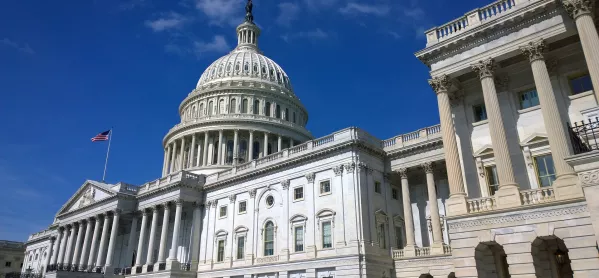- Home
- The US teachers trying to take down Trump
The US teachers trying to take down Trump

It was while contemplating the students in her social studies classroom one day at John F Kennedy High School - many of them struggling through the same poverty she did growing up - that Jahana Hayes had a moment of epiphany.
“Who will speak for them? Who will share their story with the world?” she asked herself. “And I said, ‘Me.’”
So Hayes, a former national teacher of the year, entered the race for Congress from her home state of Connecticut, and won the primary contest to run as a Democrat in Tuesday’s American mid-term elections that could shift control of the US House of Representatives away from President Trump’s Republican Party.
She’s one of 1,455 teachers on ballots this autumn nationwide - by far a record, according to the National Education Association union.
Many have jumped into elections for state legislatures after years of stagnant salaries and budget cuts for education that culminated in a flurry of teacher walkouts in the spring in Arizona, Colorado, Kentucky, North Carolina, Oklahoma and West Virginia.
The so-called “Education Spring” generally resulted in pay increases and promises to reinvest in deteriorating schools, and it emboldened many teachers to continue the fight as candidates.
The walkouts were “a catalyst for educators to run for office to fix the state and local governments that failed them,” says Randi Weingarten, president of the American Federation of Teachers union. “Teachers are turning this moment into a movement.”
But it’s not just concerns about education funding that is politicising American teachers. It’s antipathy toward Trump, which has brought out legions of aspiring politicians from within the profession - particularly women and racial and ethnic minorities; 70 per cent of teachers who are candidates are running as Democrats.
“Our interest, for starters, began once President Trump was elected,” says Carrie Pugh, the NEA’s national political director.
They’re also clearly motivated by issues such as school shootings and children being separated from their immigrant parents on the nation’s southern border.
“A lot of teachers are at ground zero in terms of various kinds of policies that affect kids and families, and they see these things up close,” says Jeffrey Henig, director of the politics and education programme at Teachers College at Columbia University. “Issues like immigration reform and school safety aren’t abstract for them.”
Pugh says that “when [teachers] give their stump speeches, there is a common thread that runs through these candidates, and it’s wanting more for their communities and more for their students that is clearly driven by their experiences and their circumstances in the classroom.”
Teachers also enjoy general public support at a time when many people in American society, from career politicians to journalists, are under siege. More than three-quarters of Americans approve of their local teachers, a survey by Ipsos found.
Unions, on the other hand, are much less popular - including teachers’ unions. Fewer than half of Americans think teachers’ unions are good for education, the Ipsos survey found. And while the unions are providing organising help and training, many of the teacher candidates are concentrated in states with little union presence. There are nearly 40 in Kentucky alone, for instance, and about 100 in Oklahoma.
“It’s places where the teachers’ unions themselves have been structurally weak and where the state legislatures have been dominated by conservatives who have been very fiscally conservative, and funding for education has decreased” that teachers appear most likely to run, says Henig. “In these states with weak unions, one advantage is teacher candidates are seen as teachers and not as representatives of the union.”
These teachers have already forced other candidates for office to promise better education funding, including Republicans who have not historically supported that.
Even Wisconsin governor Scott Walker - under whom education funding was generally stagnant - teachers were stripped of collective bargaining rights, and the number of students using taxpayer-funded vouchers to go to private schools was doubled - is calling himself “the education governor” in his bid for re-election.
His opponent? A former teacher.
“Win or lose,” Pugh says, “you’re going to see a pipeline of educators running for office for years to come.”
Keep reading for just £1 per month
You've reached your limit of free articles this month. Subscribe for £1 per month for three months and get:
- Unlimited access to all Tes magazine content
- Exclusive subscriber-only stories
- Award-winning email newsletters



